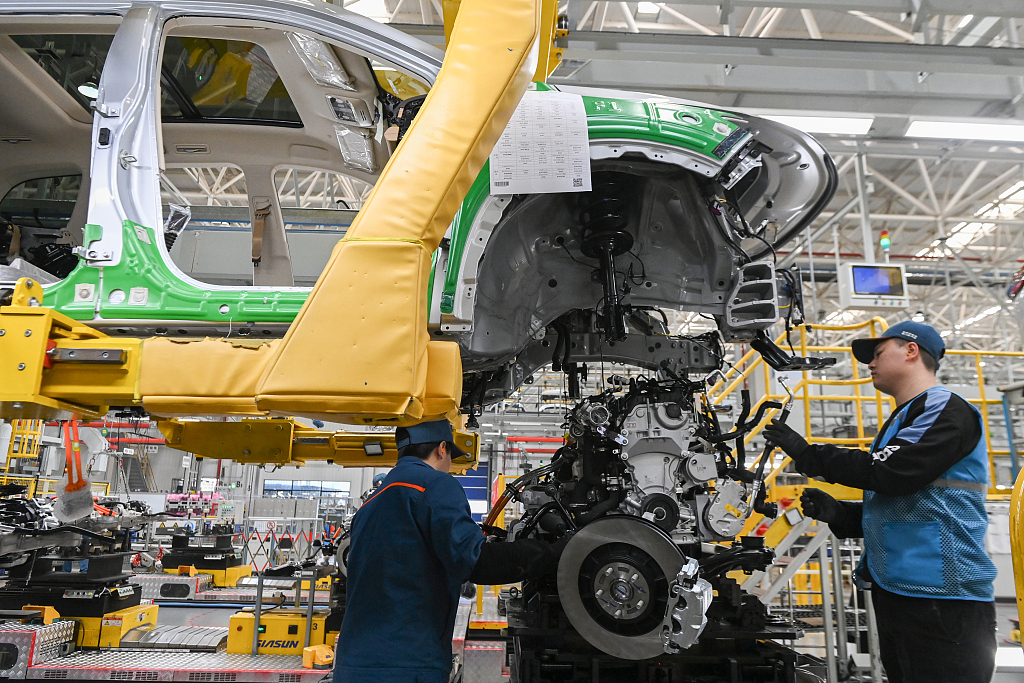
Workers install car wheels at the assembly workshop of the Seres factory in Shapingba district, Chongqing on March 11, 2024. [Photo/VCG]
Sichuan province and Chongqing municipality, as pivotal parts of a national strategy aimed at developing the Chengdu-Chongqing Economic Circle, have boosted their automotive industry to unprecedented levels, leading to the establishment of a 1 trillion-yuan ($139 billion) vehicle industry cluster.
In 2021, China issued a master plan to build the Chengdu-Chongqing region into an economic center with national impact, a key hub for scientific and technological innovation, a new area for reform and opening-up and a place with high-quality living standards.
It is expected to make China's growth more balanced while coping with downward economic pressure and help China's southwestern region tap into potential talent, improve the business environment and grow new business models, according to experts and officials.
In 2023, the economic scale of the Chengdu-Chongqing Economic Circle reached 8.19 trillion yuan, contributing 6.5 percent to the national economy with only 2 percent of the country's land area. The area has established three national advanced manufacturing clusters and four national strategic emerging industry clusters.
Chongqing, an industrial powerhouse in China, is catching up with Guangdong province in terms of auto production as it was runner-up in 2023, and it aims to build a trillion-yuan level world-class intelligent new energy vehicle industry cluster.
It has now partnered with the neighboring province to foster a bigger auto industry.
In 2021, Sichuan and Chongqing jointly unveiled an implementation plan for fostering high-quality collaborative growth within the automotive industry and building a trillion-yuan automotive sector.
In recent years, Sichuan and Chongqing have capitalized on the automotive industry's shift toward intelligent connected NEVs, boosting brand visibility and advancing into higher market segments. Currently, the two regions have cultivated mid-to-high-end brands like Avatr, Aito and Zeekr, according to the Chongqing Municipal Commission of Economy and Information Technology.
Avatr is a joint venture between Chang'an Auto, lithium-ion battery provider CATL and Huawei.
"Our vehicles are not just made in Chongqing but also made in Sichuan and Chongqing. We collaborate with about 260 suppliers for our company's passenger vehicles in these regions," said Zhang Fatao, vice-president of Chang'an Auto, during a recent interview.
"The reason that the Aito M9 is hailed as the representative of domestic luxury cars is because it not only meets or exceeds the levels of traditional luxury in aspects like space and interiors, but also leads its competitors in terms of intelligence and electrification," said Zhang Xinghai, chairman of Seres, at the Seres Auto Super Factory in Chongqing Liangjiang New Area.
Aito M9, made by Seres, is a six-seater SUV that features a futuristic smart cockpit running on Harmony OS, Huawei's operating system.
The high-end cars have enhanced the brand value of Sichuan and Chongqing's auto industry and also boosted its production and sales. From 2021 to 2024, the cumulative automobile production in these two places reached 12.57 million units, with an average annual growth rate of 7.23 percent, of which the cumulative production of NEVs reached 2.378 million units, with an average annual growth rate of 70.47 percent.
At present, Sichuan and Chongqing have a total of more than 600 NEV parts companies, and about 300 automobile-related software companies covering all the major areas in NEVs, according to the Chongqing Municipal Commission of Economy and Information Technology.